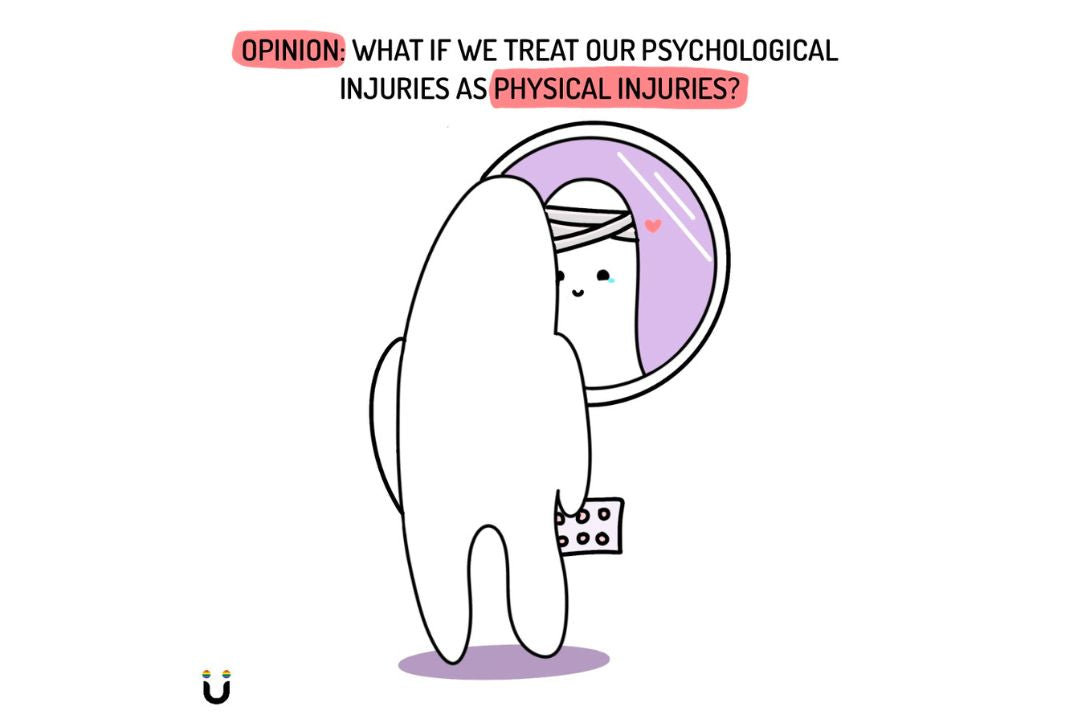Quite often, I’ve had conversations with exasperated clients who express frustration at how they don't seem to see any change in themselves through their first few months into therapy. And every single time, I’ve found myself giving them an analogy on how they would treat themselves if they had a broken leg.
Recently in a session, I found myself reaching in for the analogy again.
This got me thinking, what if we treated psychological wounds like physical injuries? I’m sure this idea has been explored before but hear me out.
Think about a time you have hurt yourself, maybe it was a fracture, a burn, a minor cut, a bite, or even the standard fever. How have people responded to you? I usually see that people are capable of a lot of empathy when they are able to see a symbol of hurt; such as a cast, gauze, hospitalisation, or if they see you just flailing around with a high temperature. They may offer you a seat, ask you about how you are doing, offer to help you out, maybe check in with the progress of your injury. You may also get the liberty to cancel your appointments, inform your work place, rest your body, be asked to take it slow; in short, there is a lot of internal and external support that a physical injury receives for obvious reasons. See, here’s the thing. If you are physically injured, there is a lot of empathy and sympathy shown towards the limitations that come with it in your daily life. You may not find yourself constantly having to reiterate that you are unwell when you have a physical illness.
A psychological wounding, on the other hand, is a whole other story. With a physical injury, we don’t question the time it takes to heal, we don’t usually say “could you give me something that mends my bones overnight?”
However, the unseen and unchartered territory of psychological wounding may put us in a position where we don’t realise when our expectations from therapy (and ourselves) are unrealistic. Quite often, because psychological or emotional wounding is invisible to the wounded as well. When we are looking to get well mentally, we tend to discount so much of what has got us there in the first place. There is an urgency that some of us feel to get better, sometimes the reasons appear obvious like,“my mental state is affecting my life and I want to change it”, or maybe even “this has gone on for too long”.
Sometimes, the reasons might not be as obvious, the shame that comes with the stigma attached with therapy, discomfort with talking about what bothers you, fear of appearing “weak” that you need to talk to a psychotherapist. It is not as simple as going to your GP and getting a prescription for antibiotics or painkillers.
And that’s just the tip of the iceberg.
Not only are the symptoms of physical wounding visible, they are also usually benign. Apart from making you scream and hurt in the moment, they do not have consequences that radiate to others or even to your future life. Whereas experiences of phobias, anxieties and depression have far reaching consequences that overshadow the brilliance of the people experiencing them because they can be debilitating. Which is another difference between physical and psychological wounding.
It is only when a psychological issue becomes debilitating that we tend to really pay attention to our psychological health. And then we expect to undo years of untouched, unhealed emotional experiences, in a mere 8-10 sessions. Few of which are also devoted to the guilt one has accumulated over the experiences.
You have to decipher what the symptoms mean, when you see a cut - it's pretty straight forward - it's a cut. But when you see consistent procrastination, it could range from anxiety, ADHD, depression, or even a simple lack of vitamin D.
Another aspect here is how psychological wounding can have a snowball effect because of misattributions. Sometimes, anxiety manifests as anger and desire to control, and depression can look like a friend who goes off the grid often and doesn’t turn up for parties. ADHD can look like someone who shows great potential but consistently underperforms. The symptoms of psychological illness tend to end up being judged, and thus, carry the possibility of more wounding. Quite often, we don’t put two and two together when someone is grappling with a psychological wound - we interpret their behaviours as being who they are. In fact, all of this happens over a long period of time - others and ourselves may not be able to acknowledge the factors that have led to internal wounding.
The physically injured garner support and need no explanations. Telling someone you have a physical illness is not met with as much of disbelief as telling someone of a mental illness. People won’t usually say “How could this happen to you? You appeared so strong.”
There is an acceptance that no matter what your age or which stage in life you are in, you can fall prey to a physical illness and there is a willingness to get help; it is taken for granted that this can also be applicable to psychological illness. We don't have to justify going to doctors or getting help, which is not the same as going to therapy. Whenever I tell someone that I am in therapy too, I get the impression that they are looking for a satisfying and palatable reason for that and I also feel the urge to comply.
If we were to treat psychological injuries like physical injuries, we would be more careful with them. We would acknowledge the injury, provide empathy and support, and make accommodations towards ourselves and others. We would also understand that the healing process may take time and that we need to be patient and realistic in our expectations. We may also approach it with curiosity rather than judgement. We wouldn't have to justify and explain the need for therapy.


